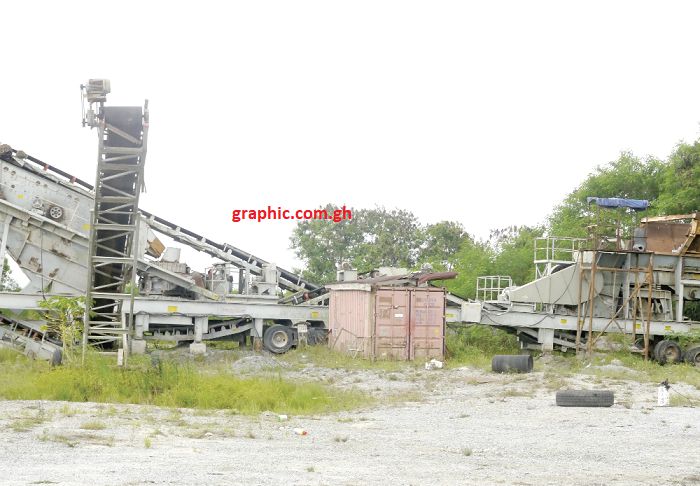
Killing the hen that lays golden egg; Ghana’s quarry sector in coma
It is a multimillion industry with the capacity to create thousands of jobs along the value chain and put food on the table of many more. Key infrastructure projects such as schools, hospitals, bridges, roads, ports and houses owe their existence to that sector.
With Ghana’s housing deficit projected to have hit two million units this year, it is expected that the government would have to build about 200,000 units of houses each year for the next 10 years to bridge that gap.
Advertisement
About 60 tonnes of granite is required to construct one housing unit. This means that 120 million tonens of aggregate is needed to meet the construction needs of the two million housing units.
There are competing needs for granite for other infrastructure projects such as classroom blocks; regional and district hospitals; regional airports; roads rehabilitation and market projects.
What this means is that the country needs a robust quarry sector that will be on its feet to deliver the granite that is needed to support these infrastructure projects.
Gloomy picture
Sadly, however, this national asset has become a prey for predatory encroachers such as estate developers, churches and businesses. The situation has compelled many of the operators to fold up while die-hard ones are barely a pale shadow of themselves.
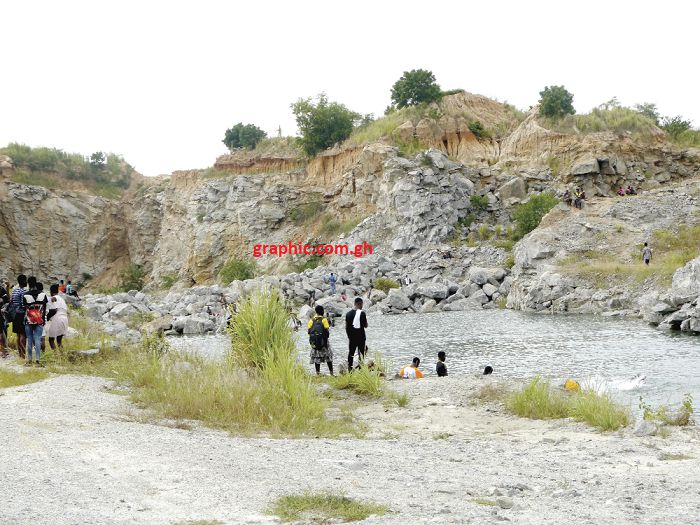
This abandoned quarry site has been turned into a recreational ground for children
For instance, the 2018 Ghana Industry report showed that out of the 146 registered concessions for quarry operations, less than 60 of them were in operation. It added that even with those quarries that were operational, none produced beyond 50 per cent of their respective rated capacities. The figures also showed that only about 20 per cent of the country’s capacity, translating into seven million tonnes of granite, was produced annually.
The law
Regulation 176 of The Minerals and Mining Regulations, 2012 (L.I 2177) states that a manager of a quarry site shall ensure that for any explosion, there is a 500-metre minimum safety distance between a blast and a person near the blast site.
The regulation adds that the manager must ensure that the size of the exclusion zone is increased if the fly rock from the blast can travel beyond the minimum safety distance of 500 metres.
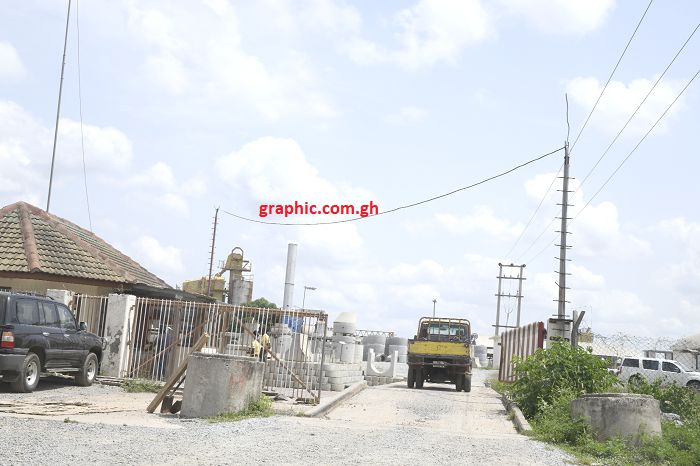
This regulation means that there should be no human settlements within a range of at least 500 metres close to the quarry site.
However, three months of visits to some of the quarry sites have revealed how most of the concessions have been swallowed up by illegal structures.
Encroachment
From Toma near Ablekuma in the Greater Accra Region; the Nsawam enclave in the Eastern Region; Buduburam in the Gomoa East District in the Central Region; to Afigya Kwabre in the Ashanti Region, the quarries are gasping for breath from ruthless encroachers.
In all the areas visited, it was observed that the at least 500-metre stretch of land reserved as buffer around the concessions had been entirely eaten up by estate developers and other illegal settlers.
In some cases, hundreds of buildings had sprung up inside the concessions.
At the ESM Quarry Limited located at Buduburam in the Central Region for instance, more than 300 buildings were seen inside the 29.5 acre concession, with many others at various stages of completion springing up.
The Manager of the facility, Mr Melvin Sarpong, lamented that he had no option but to fold up three years ago because of the threats posed by encroachers.
“The encroachers threaten the workers here with deaths and it is so serious; but any time you report to the police, district assembly authorities or the Minerals Commission, nothing happens,” he lamented.
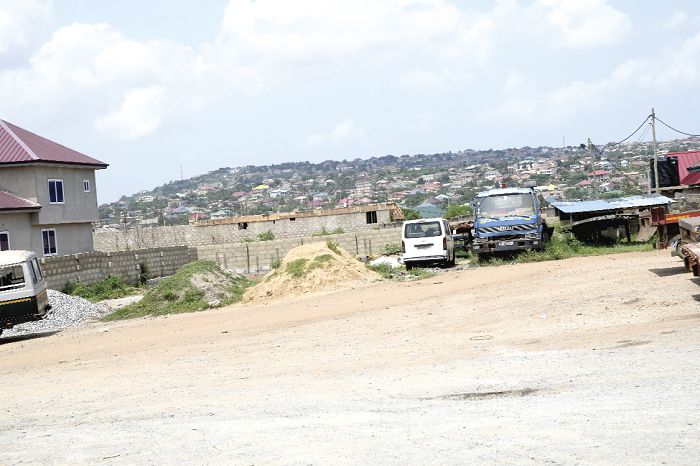
Scores of structures swallow the RCP quarry at Toma, near Ablekuma in Accra
Meanwhile the encroachers, including churches and businesses, now have a field day after the company folded up its operations.
On one of my visits to the area on a holiday, scores of children had converted one of the big blast pits into a swimming pool for recreational activities.
More encroachment
Along the Nsawam enclave, quarry companies such as Swedru Contractors, Kwadwo Asante and the Ghana Highway Authority (GHA) have all folded up.
The Regimental Concrete Product (RCP) Quarry located at Toma near Ablekuma in the Greater Accra Region is also having its fair share of encroachment.
Although it has not closed down, it is suffocating from the threats posed by encroachers.
The level of encroachment is dire as people have built their houses up to about 10 metres away from the main gate into the concessions.
The strings of quarry concessions at the Afigya Kwabre District in the Ashanti Region are also caught in the web of encroachers.
The Chairman of the Northern Sector Quarry Operators Association, Mr Adu Tutu, expressed worry that the combination of chieftaincy, court cases and sluggish law enforcement by mandated state authorities had made the situation in the Ashanti Region even more troubling.
It’s complex
The metropolitan, municipal and district assemblies (MMDAs) that have the mandate to protect the quarry concessions from encroachment are struggling to do so.
They have the responsibility to issue permits before any structures are built. However, they appear helpless in exercising this oversight responsibility.
For instance, the Chief Executive of the Gomoa East District, Mr Solomon Darko Quarm, said the encroachment activities at ESM Quarry were a really tricky puzzle to solve.
“The assembly will not issue any permit to someone to build close to a quarry because we know the health impact and other challenges it poses to settlements. We are dialoguing with the owner of the quarry and the encroachers to determine the issues. If we scrutinise the documents of the parties and are convinced that the buildings have to be demolished, we will do that in accordance with the law,” he stressed.
Call
The Chairman of the Commercial Quarry Operators Association (COQOA), Dr Ebenezer Mireku, called for the mandated state agencies to enforce the laws to save quarry concessions.
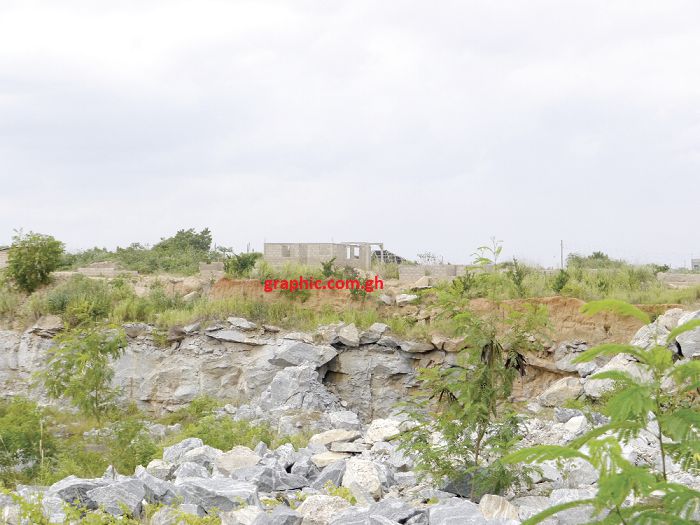
Illegal structures take over the ESM quarry site
“Granite is a public asset and that is why there is a concession on it, so this encroachment issue is a national crisis.
“It costs around GH¢10 million to set up a quarry, but these investments are going down the drain because of encroachments. We are losing raw materials for infrastructure projects, employment opportunities have been hampered and the government is also losing revenue,” he stressed.



